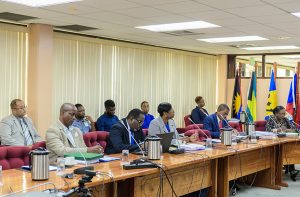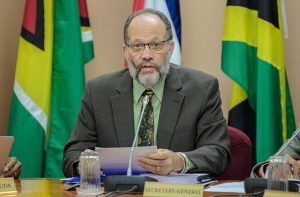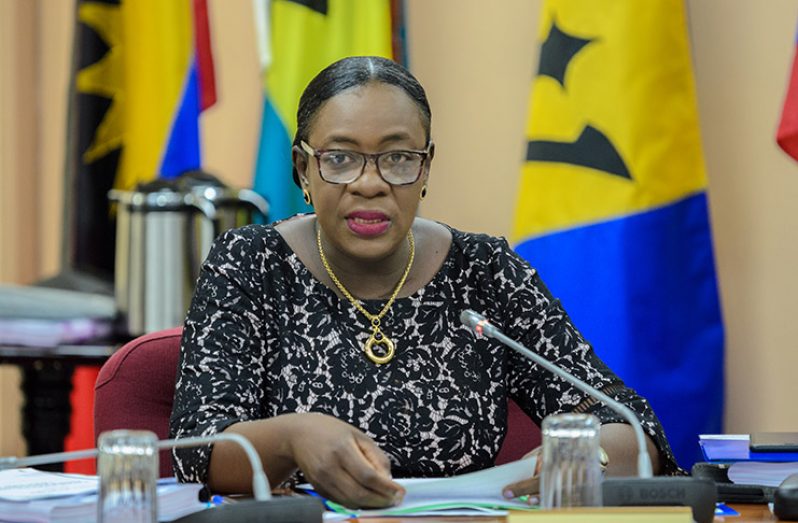– regional education ministers urge
THE Caribbean Community (CARICOM) must continue to invest in education for the social and economic development and sore issues which continue to plague the Region’s Education systems ought to be addressed head-on.
These concerns were relayed at the 38th Meeting of the Council for Human and Social Development (COHSOD) on Education hosted at the CARICOM Secretariat on Wednesday.
In attendance were CARICOM Secretary-General, Ambassador Irwin LaRocque; Ministers of Government within the Caribbean including Guyana’s Minister of Education, Dr. Nicolette Henry; Assistant Secretary-General of Human and Social Development, Dr. Douglas Slater; Director of Education at the Ministry of Education in Antigua and Barbuda and Representative of the Chairman of COHSOD, Clare Browne and several senior education officials.
At the two-day meeting, the stakeholders involved will primarily discuss the CARICOM Human Resource Development (HRD) 2030 Strategy and the actions needed at the level of Member States, the CARICOM Secretariat and other institutions, to meet the Region’s full education potential.

In opening remarks, the Secretary-General stated that for continued economic growth and social transformation in CARICOM, there must be strategic investment in people. He noted his satisfaction that, through the meeting, the council will agree on a plan of implementation of the HRD Strategy, examine the barriers to quality education delivery and human capital development and address the need for active leadership in the Region.
LaRoque also underscored that the meeting must deliberate on the importance of quality teaching as shortfalls in this regard influence the success or failure of students.
Expounding on the importance of quality education in the Region, LaRoque noted that the World Bank’s 2018 World Development Report shows that education continues to be financially beneficial worldwide.
Statistics show that there is a nine per cent increase in hourly earnings for one extra year of schooling. On this note, he urged the education minsters present to continue to make the case to their Cabinets for the prioritisation of financing education and training.
“The reality is, [quality education] cannot be practically realised in the absence of investment to support its implementation… it is an investment with high returns,” the Secretary-General stressed.
Other key issues he pinpointed related to the matters of health in primary and secondary schools and the reoccurring challenge of school-based violence. LaRoque advised that the matters at hand be treated meticulously for the benefit of current and future generations.
“The matters before you require deep interrogation. I am certain that you will have productive discussions over the next two days. I look forward to the conclusions which should ensure that this Community becomes a globally competitive, knowledgeable and skilled society by 2030,” he said, adding:
“We must commit to continue investing in our human resource, to contribute to the resilience we need to prosper and grow and become the viable Caribbean Community that we all desire.”
Meanwhile, in brief remarks, Minister Henry stated that quality education aids critical thinking and the Region must not be left behind when it comes to utilising all forms of technology to achieve this goal.

She welcomed the ongoing discussions in several jurisdictions on standard testing for Grade Six students and comprehensive sexual education. “Quality education is not only about access to education, but it also requires a reorientation of the education system…quality education encourages the development of critical thinking which fosters the desire and capacity for lifelong learning,” Minister Henry said.
Dr. Henry also Highlighted the importance of safe and enabling environments within the school system and stated that the improvement of education delivery in the Region is a task for all stakeholders involved.
She stated, “I’m of the view that a critical part of our discussions should be centered on how we can better prepare our students and even parents to be able to contribute to that needed enabling environment. This not only addresses the importance of parent education programmers, but brings a wider cross section of society in to play as it requires a community based participatory approach that challenges many sections of our community to step up.”
At the COHSOD Meeting, remarks were made by the Director of Education in Antigua and
Barbuda on behalf of the island’s Minister of Education, Michael Browne. The CARICOM HRD 2030 Strategy is a long term regional policy framework endorsed by Heads of Government in 2017 to lead the development of human resources in CARICOM.



.jpg)









